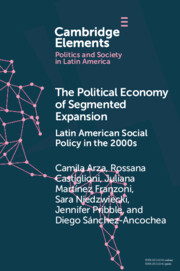Refine search
Actions for selected content:
7 results
Lock-in from within: Challenges to expanding cash transfer programs in Peru
-
- Journal:
- Journal of International and Comparative Social Policy , FirstView
- Published online by Cambridge University Press:
- 03 September 2025, pp. 1-15
-
- Article
-
- You have access
- Open access
- HTML
- Export citation
Comparative pension reform pathways in Latin America and Southern Europe: A tale of successes, failures, and future challenges
-
- Journal:
- Journal of International and Comparative Social Policy / Volume 41 / Issue 1 / March 2025
- Published online by Cambridge University Press:
- 02 July 2025, pp. 49-62
-
- Article
-
- You have access
- Open access
- HTML
- Export citation
A Haunting Legacy: Systemic Ableism in Canadian Housing Policy for People Labelled with Intellectual and Developmental Disabilities
-
- Journal:
- Canadian Journal of Political Science/Revue canadienne de science politique / Volume 58 / Issue 3 / September 2025
- Published online by Cambridge University Press:
- 13 June 2025, pp. 565-590
-
- Article
-
- You have access
- Open access
- HTML
- Export citation

The Political Economy of Segmented Expansion
- Latin American Social Policy in the 2000s
-
- Published online:
- 27 October 2022
- Print publication:
- 08 December 2022
-
- Element
- Export citation
The politics of pension policy responses to COVID-19: comparative insights from Chile, Bolivia and Peru
-
- Journal:
- Journal of International and Comparative Social Policy / Volume 38 / Issue 3 / November 2022
- Published online by Cambridge University Press:
- 10 October 2022, pp. 208-222
-
- Article
-
- You have access
- Open access
- HTML
- Export citation
Investigating the radical right's family policy agenda: evidence from six European countries
-
- Journal:
- Italian Political Science Review / Rivista Italiana di Scienza Politica / Volume 53 / Issue 2 / July 2023
- Published online by Cambridge University Press:
- 02 August 2022, pp. 179-200
- Print publication:
- July 2023
-
- Article
-
- You have access
- Open access
- HTML
- Export citation
What is hindering progress? The marginalization of women's sexual and reproductive health and rights in Brazil and Chile
-
- Journal:
- Journal of International and Comparative Social Policy / Volume 31 / Issue 3 / October 2015
- Published online by Cambridge University Press:
- 09 March 2020, pp. 255-270
-
- Article
- Export citation
